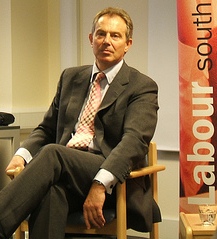Tony Blair

Tony Blair (born 6th May 1953), as Prime Minister of the United Kingdom from 1997 to 2007, perhaps earned a reputation as one of the most controversial holders of Britain's highest political office. Internationally, he was best known for supporting a much-opposed US-led war in Iraq, the repercussions of which are ongoing in the Middle East and the wider world; domestically, his legacy included the abolition of socialism as the fundamental tenet of his ('New') Labour Party, and the introduction of the private sector into British health and education. He currently serves as a Middle East envoy, working to bring about a 'two-state' solution to the conflict over Israel and Palestine.
Current career
Anthony Charles Lynton Blair's experience as a prime minister might have made him an uncontroversial choice for a Middle East envoy, were he not also one of the main architects of the Iraq War.[1] His appointment by the 'Quartet' of the USA, the United Nations, Russia and the European Union was welcomed by Israel and broadly by the Palestinian Authority, but opposed by the Hamas terrorist organisation currently controlling the Gaza Strip. His official role is to work with the Palestinian people to develop the infrastructure and the economy, with the goal of creating a Palestinian state.[2]
Resignation and departure as Prime Minister
Resignation announcement
10th May 2007 marked the official announcement of the end of Blair's premiership, with a departure date set for the following 27th June.[3] In a speech made in his Sedgefield constituency, Blair announced a timetable for leaving office, paving the way for his successor Gordon Brown after over ten years of power. In words that emphasised his domestic record more than his international influence, Blair credited his government with lowering crime, stabilising the economy and improving public services; he also emphasised that it had placed the UK at the forefront of fighting terrorism, tackling climate change and providing aid to troubled regions such as Africa. Often accused of having a fervently religious approach to wider issues,[4] he also remained committed to the view that time would see his decision-making vindicated:
I did what I thought was right. I may have been wrong, that's your call, but I did what I thought was right for our country.
An apology for his most-criticised activities was unforthcoming. In concluding, however, Blair admitted that he had made unspecified mistakes:
My apologies to you for the times I've fallen short. But good luck.
Final acts as Prime Minister
Tony Blair's final appearances as an international politician were at the 2007 Group of Eight (G8) summit held between some of the world's most economically powerful states, and a meeting of the European Council of European Union countries. These actions would be expected from a premiership often strongly focused on issues outside the UK's borders, though Blair's intention to bring the country closer to its European partners was not entirely fulfilled.[5] Back in Britain, Blair's final days as Prime Minister saw his name rarely out of the national press: he called the media a "feral beast" while admitting his government's early desire to 'spin' stories may have aggravated this issue;[6] and he strongly criticised the proposed academic boycott on Israeli universities in one of his final performances in the UK's lower house of parliament.[7] As for the upper house, he reaffirmed his view that the House of Lords should remain appointed rather than elected.[8]
Departure
27th June 2007 saw Tony Blair resign as Prime Minister of the United Kingdom;[9] his final act in office was to appear for the usual weekly questions to the premier in the House of Commons, where political friends and foe alike paid tribute to some of his record, such as continuing the work towards long-term peace in Northern Ireland. Blair conceded that he had "never pretended to be a great House of Commons man", acknowledging the view that his tenure had seen moves to sideline Parliament; and he apologised for the dangers British troops faced in Iraq. His words of farewell underlined the finality of the event:
I wish everyone, friend or foe, well and that is that, the end.
Immediately after leaving office, Blair severed his final link with UK domestic politics by stepping down as Member of Parliament for Sedgefield, a constituency he represented in the British parliament from 1983 until his appointment as a Middle East envoy in 2007.
Footnotes
- ↑ As reported on CNN, Blair's new role in the Middle East was greeted with some incredulity: see 'Blair resigns as UK prime minister.' 27th June 2007.
- ↑ BBC News: 'Hamas criticises Blair envoy move.' 28th June 2007.
- ↑ BBC News: Blair will stand down on 27 June'.
- ↑ Blair referred to this in his Sedgefield speech as a "Messianic zeal", a characteristic he clearly rejected.
- ↑ According to the historian Anthony Seldon. BBC News: '[How will history judge Blair? http://news.bbc.co.uk/1/hi/uk_politics/6636091.stm#seldon].' 10th May 2007.
- ↑ BBC News: 'Media 'like feral beast' - Blair.' June 2007.
- ↑ BBC News: 'Blair decries Israel boycott move.' June 2007.
- ↑ BBC News: 'Blair still backs appointed Lords.' 18th June 2007.
- ↑ BBC News: 'Blair resigns as prime minister.' 27th June 2007.
External links
- tonyblairoffice.org - Official site with details of Tony Blair's post-Downing Street career.
- Tony Blair archive - official record of Tony Blair's speeches, films and podcasts from the UK Prime Minister's website.
- The Blair Years 1997-2007 - BBC articles covering major events of Tony Blair's premiership, with analysis.